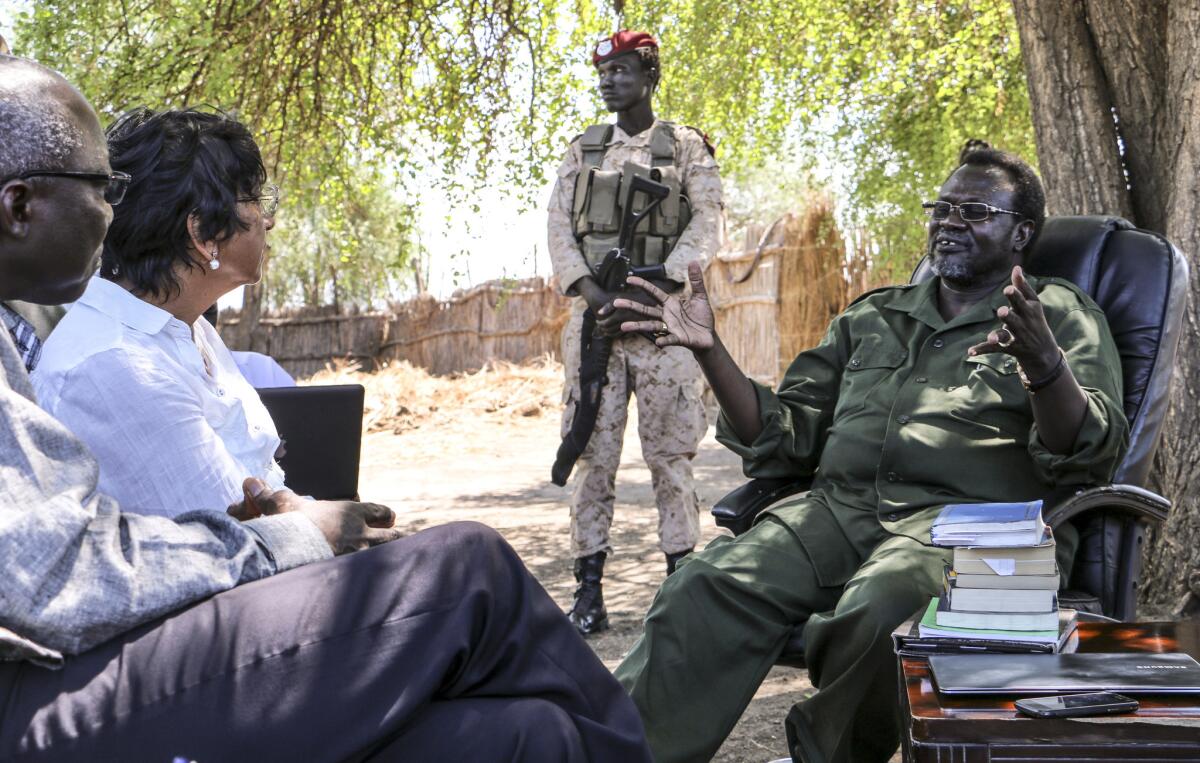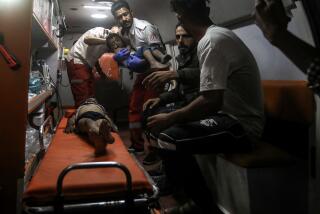U.N. human rights chief blasts South Sudan’s leaders as famine looms

- Share via
Reporting from Johannesburg, South Africa — Famine looms in South Sudan. The planting season is already half over, with terrified farmers scattered far from home because of fighting. But the country’s leaders seem unconcerned about the impending catastrophe, the United Nations’ top human rights official said Wednesday.
In meetings this week with the leaders of feuding political camps, rights chief Navi Pillay called for a 30-day truce to allow people to return and plant crops. Both men, she said, offered the same lukewarm response and the same excuse: They don’t trust each other.
“I was appalled by the apparent lack of concern about the risk of famine displayed by both leaders when I raised the issue,” Pillay told a news conference in Juba, the capital, after two days of meetings with President Salva Kiir and his rival and former vice president, Riek Machar.
“The prospect of widespread hunger and malnutrition being inflicted on hundreds of thousands of their people, because of their personal failure to resolve their differences peacefully, did not appear to concern them very much,” Pillay said.
She called for investigations, arrests and independent prosecutions of those guilty of crimes against humanity, adding that widespread human rights violations had been committed. About 9,000 children have been recruited to fight on both sides of the conflict, according to UNICEF.
“Without accountability, there is nothing to deter others from committing similar summary executions and mass killings,” Pillay warned.
The split in December within both the ruling Sudan Peoples Liberation Movement and the army initially saw men from Machar’s Nuer ethnic group rounded up and killed in the capital by security forces. Those attacks triggered horrific killings between different ethnic groups in other parts of the country.
More than 1 million people have been displaced and thousands have been killed.
Pillay blamed both leaders for refusing to observe a January agreement to cease hostilities and called on them to “stop blindly dragging their people down the path of self-destruction.”
Fighting intensified in recent weeks, with forces loyal to Machar claiming Bentiu, sweeping through the strategic northern oil town and gunning down hundreds of non-Nuers based on their ethnicity and nationality, according to the United Nations. Days later in reprisal, gunmen invaded a U.N. peacekeeping base in Bor and killed 50 civilians sheltering there, many of them women and children.
Humanitarian agencies fear famine will take hold this year because farmers cannot plant. Rival forces are trying to seize terrain before the approaching rainy season cuts off large regions of the north.
Prices for food staples in some areas have risen 150% since December because of shortages, according to the U.S.-funded Famine Early Warning System, which issues alerts on food emergencies.
It warned Monday that food insecurity is likely to deepen in coming months because of the conflict, which is expected to continue to disrupt planting, fishing, hunting and gathering of wild food.
“The deadly mix of recrimination, hate speech and revenge killings that has developed relentlessly over the past four and a half months seems to be reaching boiling point,” Pillay said, “and I have been increasingly concerned that neither South Sudan’s political leaders nor the international community at large seem to perceive quite how dangerous the situation now is.
“With the rainy season just starting, we also urged the leaders to show more concern both for the 1.2 million people displaced inside South Sudan, or in neighboring countries, and the many other South Sudanese who are now in real danger of facing famine,” she said.
Oil production, which accounts for 98% of the country’s revenue, has plummeted by 29% since December. Machar loyalists who seized Bentiu threaten Paloch, the most important oil field still operating.
Pillay visited South Sudan with Adama Dieng, U.N. special advisor on the prevention of genocide. Pillay said they warned the country’s leaders that future investigations into crimes against humanity would look at whether they failed to prevent mass killings.
“If in the very near future there is no peace deal, no accountability, no space to rebuild trust and promote reconciliation, and insufficient funds to cope with a looming humanitarian disaster, I shudder to think where South Sudan is heading,” she said.
More to Read
Sign up for Essential California
The most important California stories and recommendations in your inbox every morning.
You may occasionally receive promotional content from the Los Angeles Times.










